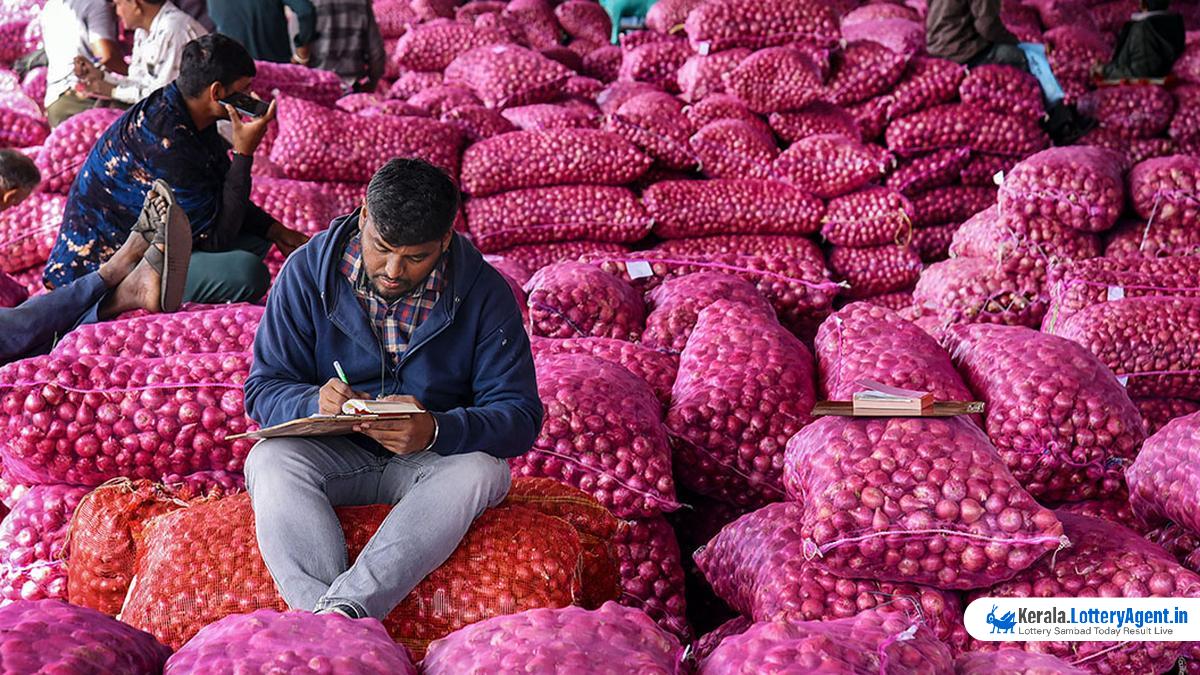
The Indian government has sought and received the required approval from the Election Commission of India to go ahead with the revocation of the ban on onion exports, due to the Model Code of Conduct currently in effect stemming from the impending Lok Sabha elections, sources have revealed.
In a move poised to potentially enhance the income of farmers, particularly in key onion-growing regions such as Maharashtra, the government has lifted the prohibition on the outbound trade of onions.
A regulatory mechanism, however, has been imposed, with a minimum export price (MEP) set at $550 per tonne, approximately translating to ₹46 per kilogram. Furthermore, an export duty of 40% has been mandated, effectively ensuring that onions cannot be shipped overseas at a price less than $770 per metric tonne, or roughly ₹64 per kilogram.
The decision to overturn the export ban came about following a recommendation from the Department of Consumer Affairs, which keeps a close watch on onion availability and pricing patterns nationwide.
It was the Department of Revenue under the Finance Ministry that reportedly sought the nod from the ECI for the reversal of the export ban.
The timing of this move is seen as significant, landing just before the critical elections for the Lok Sabha in major onion belts, including Nashik, Ahmednagar, and Solapur within Maharashtra, where farmers have been vocal about their desire for the ban to be lifted so as to secure better pricing for their yield.
Previously, on December 8 of the preceding year, the central authorities had introduced an export ban on onions early in December with the intent of reining in retail prices amidst apprehensions of a potential decline in production. Historically, over the last 4-5 years, India has been exporting between 17 to 25 lakh tonnes of onions on an annual basis.
The Consumer Affairs Secretary, Nidhi Khare, announced on May 4 that the lifting of this ban is unlikely to cause any significant fluctuation in retail market prices, stating that if prices were to increase, any such rise would be marginal. She stressed the government’s dedication to safeguarding the interests of both consumers and farmers.
The Directorate General of Foreign Trade (DGFT) indicated in a notification on the same day that “the export policy of onions is amended from prohibited to free subject to MEP of USD 550 per metric tonne with immediate effect and until further orders.” This follows closely on the heels of the Finance Ministry imposing a 40 percent export duty on May 3.
Ms. Khare justified the easing of restrictions by pointing out that supply circumstances are favorable and prices have remained stable in retail markets as well as mandies—marketplaces for wholesale or retail sale of commodities. This observation coincided with the modal price of onions being registered as Rs 15 per kilogram at the Lasalgaon mandi in Nashik during April.
As per the Secretary, the latest production estimates for the rabi season were taken into account for the decision, showing an onion output of 191 lakh tonnes, which is deemed sufficient. International market availability and price metrics were also considered in the decision-making process.
According to Ms. Khare, the domestic monthly demand for onions stands at around 17 lakh tonnes. She believes lifting the ban would incentivize farmers to allocate more land for onion cultivation, especially with forecasts predicting an above-average monsoon.
Wider consultations with stakeholders and a high-level team’s visit to key onion-producing areas in Maharashtra were part of the groundwork leading up to the decision. Ms. Khare also mentioned that onions have a relatively short shelf life, necessitating exports, and assured that the government is securing a buffer stock of 5 lakh tonnes of onions to intervene in case of price surges.
Continual monitoring of essential food item prices is a priority, she affirmed. An inter-ministerial committee (IMC) is responsible for overseeing prices, production, availability, and exports of such commodities, including onions.
This export policy change is not to be viewed in isolation; rather, it forms part of a series of measures across various commodities aimed at bolstering domestic supply and stabilizing prices. An IMC official stressed this point, especially in light of the general election context, emphasizing the commitment to strategic and thoughtful policy-making.
Earlier in March, the Union Agriculture Ministry had released onion production data that projected a decrease for the 2023-24 period, citing significant production drops in states like Maharashtra, Karnataka, Andhra Pradesh, and Rajasthan.
Last month, the Ministry of Consumer Affairs, Food and Public Distribution announced that it had sanctioned the export of 99,150 tonnes of onion to neighboring countries such as Bangladesh, UAE, Bhutan, Bahrain, Mauritius, and Sri Lanka.
The Congress had previously charged the Modi administration with grossly neglecting Maharashtra’s onion cultivators, owed to the export ban. They pledged, in their manifesto, to establish a more predictable import-export policy to avoid the imposition of such abrupt and adverse policies on farmers.













